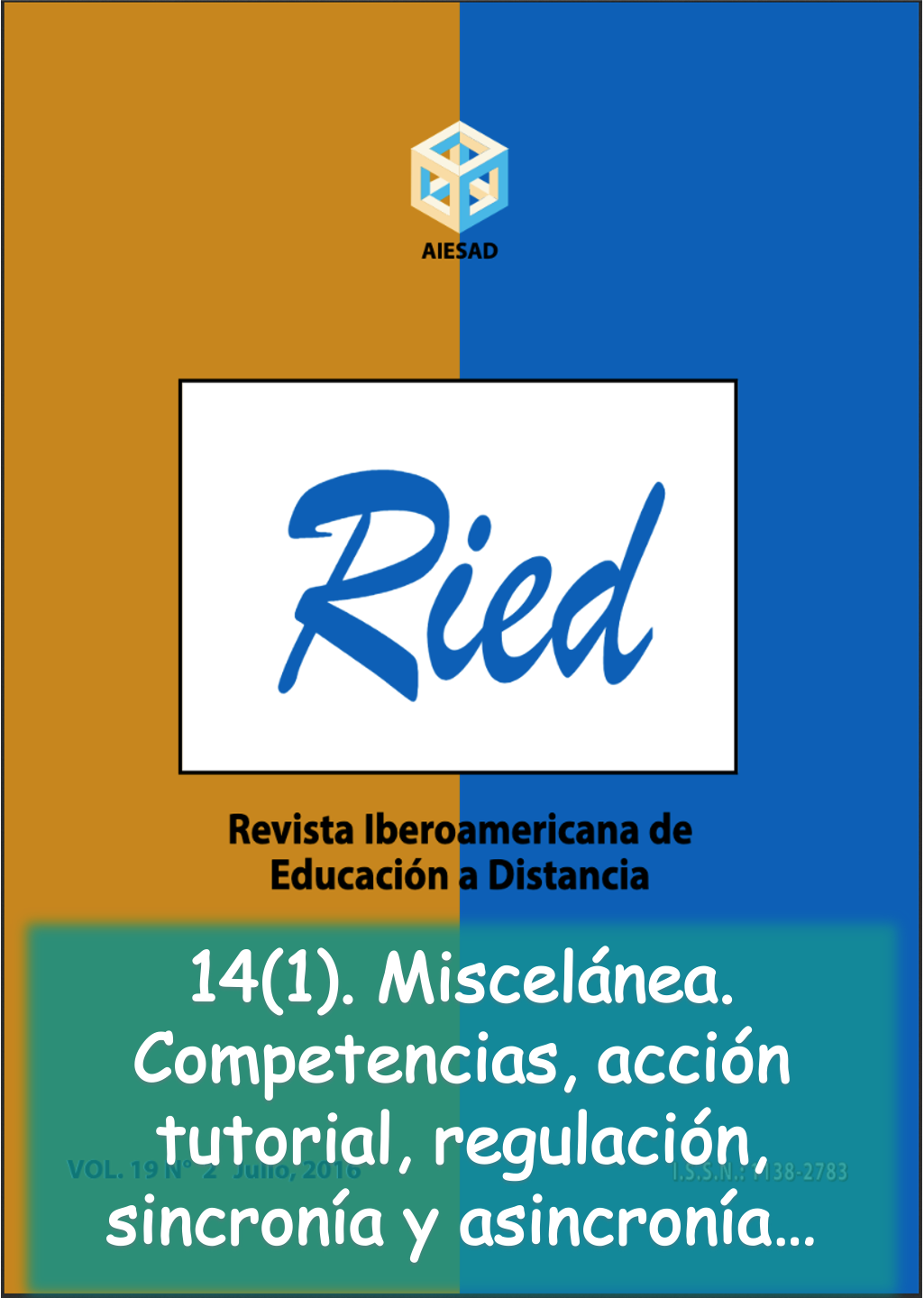The evaluation of competences for the development of e-learning tutors
DOI:
https://doi.org/10.5944/ried.1.14.801Keywords:
tutorials’ competences, e-learning, interaction, compounds, design, communicational categoriesAbstract
This article reports the initial findings of a research project called “Curricular design for competences and evaluation criteria for the development of e-learning tutors.” The results obtained by our research project in 2005-2007, “Components of the socio-constructivist pedagogical design, interaction and tutorials and impact on academic achievement in distance learning,” are taken as basic data for the present study. This background enables us to inquire about the incidence of components and the interaction between tutorials, especially their frequency and communication quality, and the students’ academic achievements and satisfaction. The report includes the analysis of two equivalent courses for the technical degree in Cultural Management, together with the technological didactic format of the discussion forums in the virtual campus, which were developed without controlled tutorials. These results are our first step toward defining competencies of on-line tutors.
Downloads
References
Banno, B. (2005). Diseños curriculares por competencias, Boletín Educativo. ISSN 0328-3534, Año 17 - N°178. Ediciones Novedades Educativas, (15-17).
Braslavsky, C. (1994). Una función de la escuela: formar sujetos activos en la construcción de su identidad y de la identidad nacional. En: Filmus (comp.), Para qué sirve la escuela. Buenos Aires: Grupo Editorial Norma.
Chiavenato, I. (1995). Administración de Recursos Humanos. México: Editorial MacGraw-Hill.
Collison, G.; Elbaum, B.; Haavind, S.; Tinker, R. (2000). Facilitating on line learning. Effective strategies for moderators. USA: Atwood Publishing.
Ehuletche, A.; Terroni, N. (2002). Elaboración de categorías de comunicación en las interacciones colaborativas. Revista del Instituto Rosario de Investigaciones en Ciencias de la Educación. CONICETUNR. Rosario, Argentina.
Ehuletche, A.; Banno, B.; Del Río, M. J. A.; Elger, S. (2003). La evaluación del soporte tutorial en la mediación electrónica desde la perspectiva de la satisfacción del alumno. RIED, Revista Iberoamericana de Educación a Distancia, 6 (1). (91-106).
Gallart, M. (2003). La formación para el trabajo y los jóvenes en América Latina. En el marco del proyecto “Formación Técnica y Profesional en América Latina”, implementada por la CEPAL y la Sociedad. [en línea] Disponible en: http://cvc.cervantes.es/ obref/formacion_virtual/formacion_ continua/peiro.htm (consulta 2007, 19 de septiembre).
Litwin, E. (2000). La educación a distancia. Temas para el debate en una nueva agenda educativa. Buenos Aires: Amorrortu.
Marcelo, C. (2005). Estudio sobre competencias profesionales para e-learning. Proyecto Prometeo. Santiago de Chile: Agencia Alemana de Cooperación Técnica (GTZ).
Peiró, J. (2006). Las competencias en la sociedad de la información: nuevos modelos formativos. [en línea] Disponible en: http://cvc.cervantes.es/ obref/formacion_virtual/formacion_ continua/peiro.htm (consulta 2007, 19 de septiembre).
Perrenoud, P. (2007). Diez Nuevas competencias para enseñar. Barcelona, España: Editorial GRAO. Proyecto Tuning América Latina. (2007). Informe final: Reflexiones y perspectivas de la Educación Superior en América Latina. [en línea] Disponible en: http:// www.tuning.unideusto.org/tuningal/ (consulta 2007, 19 de septiembre).
Santangelo, H. (2000). Modelos pedagógicos en los Sistemas de Enseñanza no presencial basados en Nuevas tecnologías y Redes de comunicación. Revista de la OEI, 24. Septiembre-diciembre. en línea] Disponible en: http://www.campusei.org/revista/rie24a06.htm (consulta 2007, 19 de septiembre).
Downloads
How to Cite
Issue
Section
License
The articles that are published in this journal are subject to the following terms:
1. The authors grant the exploitation rights of the work accepted for publication to RIED, guarantee to the journal the right to be the first publication of research understaken and permit the journal to distribute the work published under the license indicated in point 2.
2. The articles are published in the electronic edition of the journal under a Creative Commons Attribution 4.0 International (CC BY 4.0) license. You can copy and redistribute the material in any medium or format, adapt, remix, transform, and build upon the material for any purpose, even commercially. You must give appropriate credit, provide a link to the license, and indicate if changes were made. You may do so in any reasonable manner, but not in any way that suggests the licensor endorses you or your use.
3. Conditions for self-archiving. Authors are encouraged to disseminate electronically the OnlineFirst version (assessed version and accepted for publication) of its articles before publication, always with reference to its publication by RIED, favoring its circulation and dissemination earlier and with this a possible increase in its citation and reach among the academic community.








